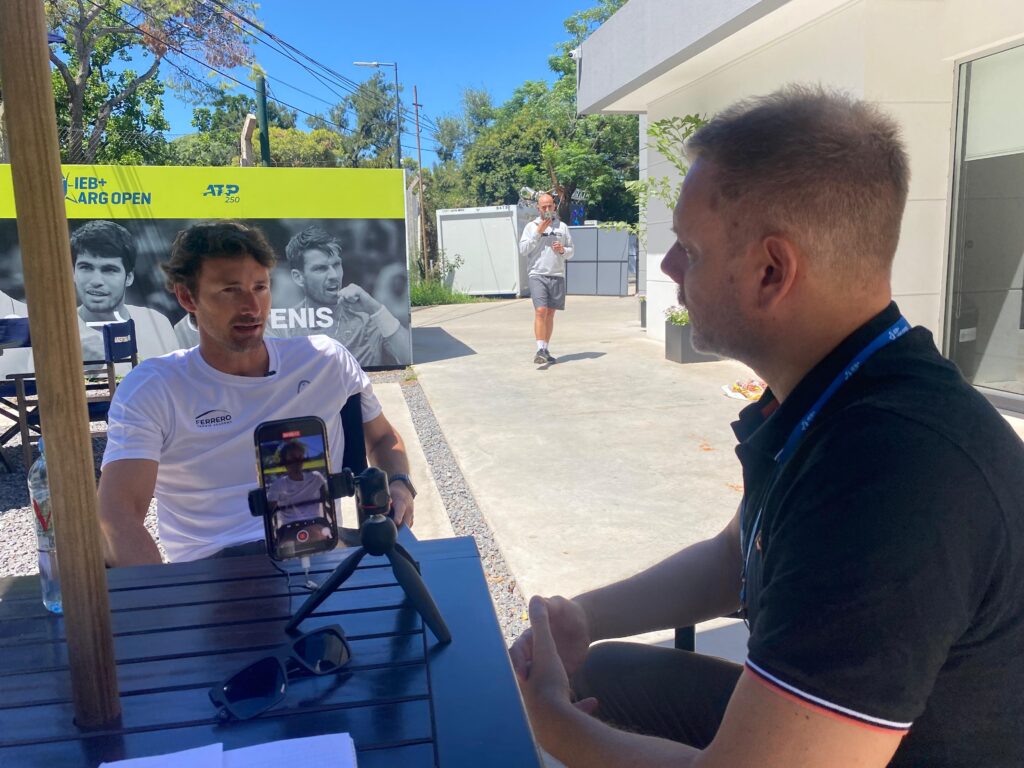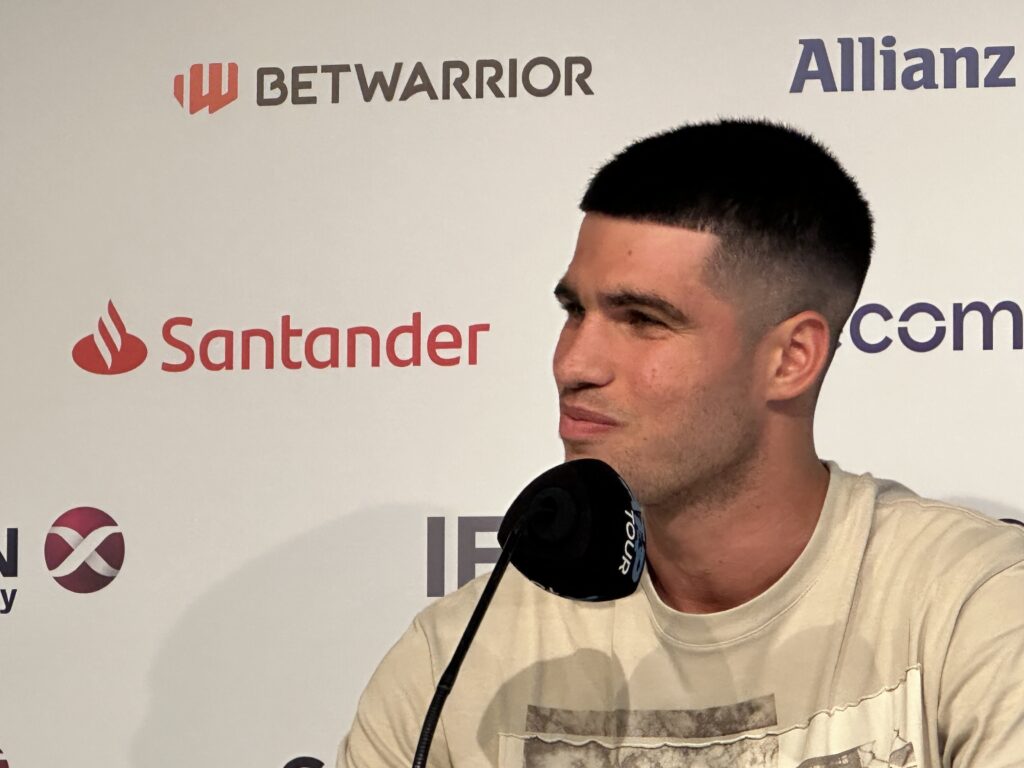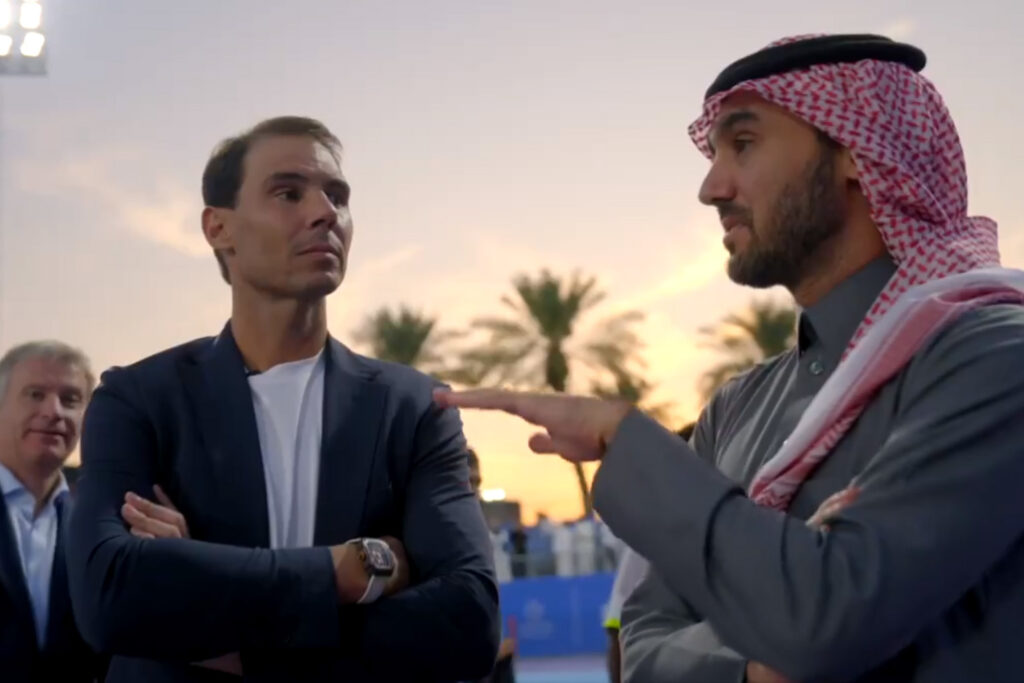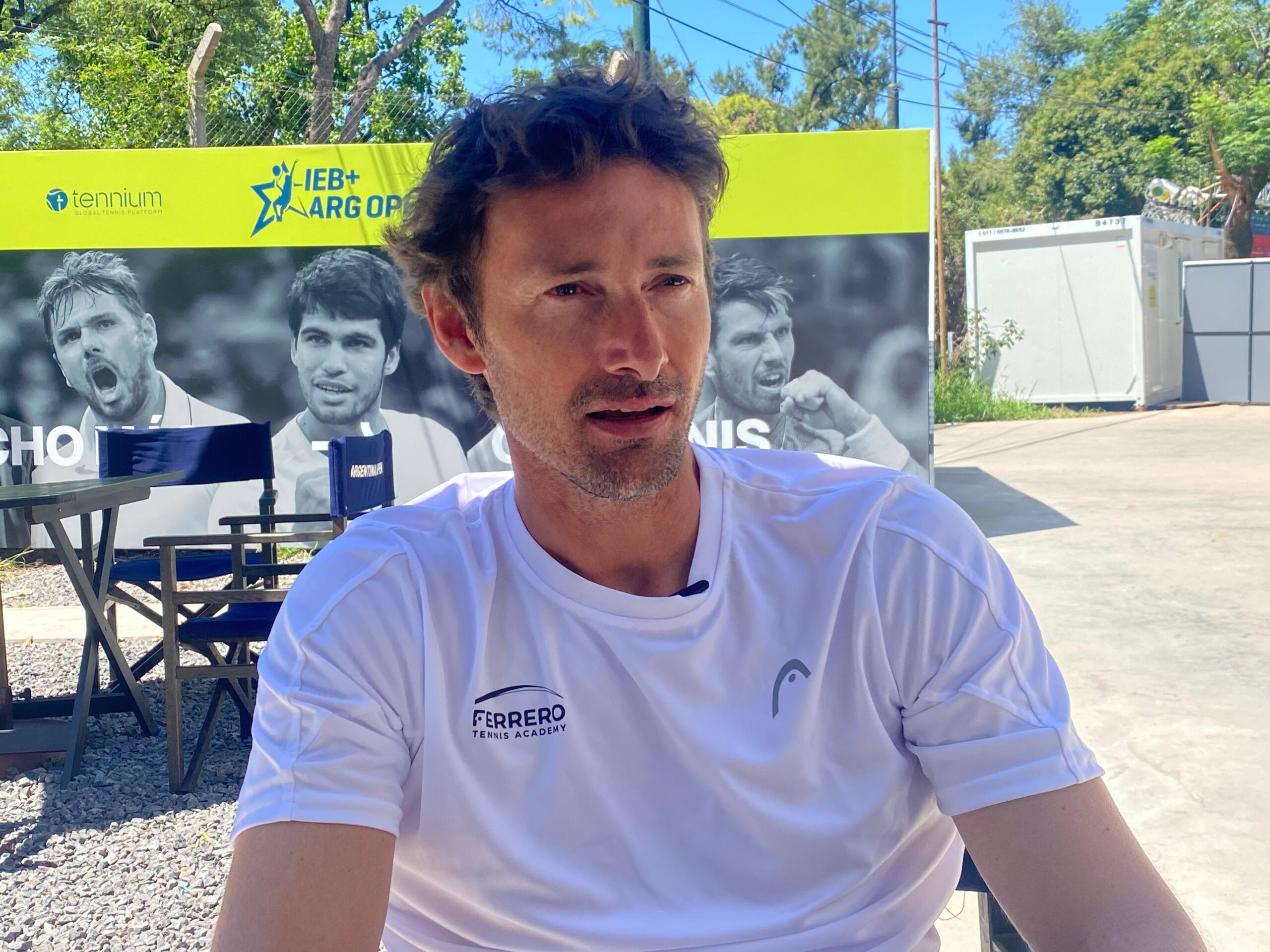BUENOS AIRES – Juan Carlos Ferrero limps slightly to the interview. He injured a cartilage in his right knee in January 2023 playing padel, underwent surgery a few weeks ago and therefore missed the Australian Open, which he followed from a distance. But he is very clear about the path that his pupil, Carlos Alcaraz, should follow in a difficult start to the season: more professionalism off court and more tactical understanding on court.
“Understanding professionalism, when to really work, when to rest, when to be focused. That, for young people today, is really complicated,” Juan Carlos Ferrero told CLAY during an interview in Buenos Aires, the tournament where the world number two fell in the semi-finals. Days later, he withdrew from his debut in Rio de Janeiro due to injury. At the Australian Open he was eliminated in the quarter-finals.
Juan Carlos Ferrero, who at 44 retains practically the same freshness in his face as when he won Roland Garros in 2003, believes that Alcaraz still has a lot to learn, especially from Rafael Nadal, Novak Djokovic and Jannik Sinner. And he disagrees with Andy Roddick’s criticism.
– How do you train a player remotely during a Grand Slam?
– There were some matches that started at four o’clock in the morning, but there were other days that were played at nine o’clock in the morning in Spain. I take it badly because I wanted to go, Carlos did a very serious pre-season, with a lot of desire. It was Samuel (Lopez) who is coach of the academy (Equelite) and Pablo Carreño’s, and I have full confidence in him. Together they won the Queen’s tournament.
– What were your logistics like before the matches?
– You talk before the match with Carlos, with Samuel and from there you give full confidence to the coach who is there. I never look at the phone when Carlos is playing and I would say Samuel doesn’t either. Samuel has more experience than me on the tour and he didn’t need me to tell him anything.
– What role does Antonio Martínez Cascales, who was your coach during your playing years, play?
– Antonio, when Samuel can’t go to the tournaments that I don’t attend, he will go with Carlos. He has no shortage of coaches… (laughs)
– In Alcaraz you have a very polished diamond, a jewel that shines, but where do you need to continue polishing details?
– A bit of everything, he’s very young, I think he needs to continue maturing as a young player to make good decisions in there. He needs to grow tactically, to know how to read the matches a little bit better, which is what experience gives you, to know the players well, well, to know what foot they are limping on or what their virtues are, to know how to enrich himself from the most direct rivals, from those who are up there, Jannik, Medvedev, Novak, Tsitsipas, Zverev. Enriching yourself from all of them to keep raising the level, learning to train every day with a clarity of ideas to improve. A little bit of everything, in the end you can’t stop the progression of a 20-year-old player. No matter how high he is.
– Andy Roddick, a name very familiar to you, recently said that Alcaraz has not improved his serve. Do you agree?
– The serve is something that Carlos is improving. When he was 15, 16 he didn’t serve well, we made a biomechanical change in his serve, it’s one of the things that is hardest to improve in a player who doesn’t serve naturally. A player like Roddick, who is a natural serve player, can improve very easily because it is his best virtue. It’s like if you tell Carlos to improve his forehand. It’s simple, because it’s his most natural stroke. The serve is something that has had to be polished little by little and he has been doing it.
– And yet it’s still a good serve. If one compares the Alcaraz of the explosion in 2022 with the Nadal of the explosion in 2005, Alcaraz serves much better.
– Yes, he has speed, he has direction, we are working on getting more consistency with the first serve, but you get there little by little. This does not stop, we have to keep improving.
– Is Roddick criticising Alcaraz’s serve too much?
– Sure, it’s easy to criticise him when it’s your best virtue and you see everything so simple. The opinion is respectable, although I don’t share it completely, because Carlos has improved his serve a lot. If you saw him three years ago you would say “fuck, how (bad) he serves”. It’s something that improves little by little, it’s not so easy to have a serve with a lot of speed and a lot of direction.
– How is your relationship with Roddick? Do you talk to each other?
– Yes, when we see each other, no more than that.

– Alcaraz has been noted that he often tries to win the point too spectacularly, is that something that worries you, or do you let it go because it means that he is happy playing?
– It’s part of his game, he plays naturally with a lot of intensity, explosiveness. And that makes a lot of his points spectacular. It’s true that he doesn’t really look to make it super spectacular, but it’s true that he likes to make people enjoy it, and at some particular point he looks for a “hot shot”, but consistency, playing tactically is not just about looking for that kind of situation, but because of the way he plays it often happens.
– Alcaraz is a showman on the pitch, you played in a very measured way. Do you see him and you are amazed, can you believe the things he does?
– He is a very extroverted player who creates a lot of charisma in terms of his character, a lot of people follow him. And to this day he still surprises me almost every day with some shots. The other day I asked him to make me in a training a rest “chiquita” (short shot), crossed, as often did Federer. He did it the first time and won the point. These are things that you can ask of people who really have those natural conditions, who create situations out of nothing. Carlos continues to surprise me, it’s his natural way of playing.
– That’s what Martínez Cascales said in an interview with CLAY: that he’s seen him do things in training that he’s never seen in tennis.
– Yes, he invents shots. The passing shot he hit against De Minaur with match point against him in Barcelona, the shot he hit against Tommy Paul in an exhibition…. These are shots that he naturally invents and he will continue to do them.
– What about a shot that you’ve seen that you can anticipate?
– Haha, I don’t know. He makes a lot of very natural shots that you don’t see today.
– Alcaraz talks about what he has to correct off the court, and last year you talked about how he has to be more professional off the court, what do you mean?
– Understanding professionalism, when to really work, when to rest, when to be focused. That, for young people today, is really complicated, because it’s often difficult for them to live the reality of what’s around them. They go from week to week, they are treated very well everywhere and they don’t see the reality. In that aspect I think he is improving a lot, I think the team structure that he has around him helps him to keep his feet on the ground. I don’t mean to say that at some point he’s got too much of an attitude, because he has a very humble character, very approachable. Learning to handle all kinds of situations well in order to keep improving mentally, tennis-wise, being on time for training and training with clarity.
– Is he punctual?
– Yes, I can’t complain.
– Is Alcaraz’s insistence that his goal is to beat Djokovic’s records a positive or a negative thing?
– It is neither positive nor negative, they are objectives that he has in the very long term, we know the difficulty that something like that requires. It comes from the character that he has to think very big. That he can get it? He knows that it is really complicated, he has to do things super, super well to achieve the objectives. It’s something that he has, what he thinks about and what makes him think that he can achieve something like that, it drives him mentally. Welcome to that.
– Today, February 2024, do you think that in 2039 he will have achieved it?
– (laughs) These are answers that I can’t give you, I live day by day, the day to day improvement. The day-to-day improvement, that I would like to? Yes, that you are going to achieve it? It’s a very complicated thing. Who can say for sure.
– What about your feelings? Is he really capable of achieving that?
– I think that with the players that there are now and will be, the competitiveness between them will be quite close. I don’t know, I really don’t know.

– Were the years of Nadal, Federer and Djokovic different in that sense?
– They’ve proved it, haven’t they? In the last 20 years they’ve won almost every Grand Slam between them. And I think in this era it might be a bit more open, because there are more players who are in contention to win a title. Not only Novak, Jannik and Carlos. You have Medvedev, you have Tsitsipas who is always close, you have Zverev whose goal is to win a tournament, you have Rune who has a lot of potential, there are a lot of players.
– Alcaraz is known all over the world, he’s 20 years old, he must be must be contacted by many women, is that something you talk about?
– Well, it comes up in conversations from time to time, obviously he has to know that in the situation he’s in, if it’s positive for him on a tennis level. At the moment he’s calm, he’s young, he’s not in a hurry to have a relationship. When it comes, it will come to him, as it has come to all of us at some point.
– The contract with Rio de Janeiro expires, Alcaraz is no longer obliged to go to South America. Will he return to play that tour?
– I can’t answer that, it’s something we’ll see later, but it’s true that at some point I’d like him to go on the fast court tour, he can do it very well. And you don’t change the surface after Australia and then change again and then go back to clay. At some point we will change.
– How do you feel about Nadal continuing to try to return to the tour?
– Super admirable, I think it says a lot about his character, the way he is, how ambitious he is. I think he wants to give himself that opportunity to finish as well as possible, he wants to feel competitive. He already showed in the Brisbane tournament that he’s good on a tennis level, but on a physical level, so much time away from the court, maybe it’s always a little bit more difficult. What Rafa has been on a mental level has always caused me the utmost admiration.
– Do you think that his motivation is to match Djokovic in the number of Grand Slam titles?
– I don’t think so, I don’t think so. I would say no. I think he wants to retire and give himself a chance to feel good on a court again and quit when he really decides, not that injuries will retire you. We don’t want that end for any player in any sport. He wants to come back and enjoy it, Indian Wells is a tournament he loves, he enjoys golf, and if he can go back there and feel comfortable on the court and feel happy, this year is what he deserves.
– It would be strange, though, to think of Nadal playing at Roland Garros without the ambition of winning the title.
– Of course, he will certainly think about it. It will depend a little bit on the previous tournaments, how he feels, that he can play many matches. If his physique doesn’t allow him to play some tournaments normally on clay courts, it will be difficult for him to be a top candidate in Paris after one, two or three matches on clay.
– Although there’s the 2022 precedent, when he arrived badly at Roland Garros and ended up winning the tournament.
– He did badly in Rome, didn’t he? One tournament. But well, if Rafa is at one hundred percent physically and mentally he will always be a candidate at Roland Garros. This year, maybe, he’s the least favourite, but you can’t rule him out.
– What do you think of Djokovic?
– I think Djokovic trains to keep winning titles, to keep breaking records. You see it in his professionalism every day, to me it generates a maximum respect, I love to see him play, train, how he plays the ball, how he moves, the attention he puts. In many aspects I give Carlos Novak as an example, as I have given Rafa or Sinner. I like to give him examples of players that I see doing things very well so that he can learn a little bit from all of them.
– What is the example of Sinner that stands out for you?
– No, no, no (laughs).
– How do you feel about Djokovic saying that he would have liked to be more friends with Nadal and Federer, or Nadal saying that Djokovic would have suffered more than him if he didn’t win the record number of Grand Slam titles?
– I think that when there is such a direct rivalry and when you are playing for such important things with the same player, it is difficult to generate a friendly relationship. If you’re playing for such big things, you have to take out a little bit of bad blood, don’t you? It’s true that with the character that Carlos has, I don’t see him that way. With Novak and Jannik, who are his most direct rivals, he gets on fantastically. The relationship that they have had between them I see as logical, normal, there has always been a fairly relaxed atmosphere.

– The irruption of Saudi Arabia, with Alcaraz who is going to play the Six Kings Slam and Nadal as ambassador of the Saudi tennis federation. What do you think about that?
– (huffs) I don’t have an opinion. They have burst into the world of sport with a lot of money, opening up a lot of possibilities in a lot of sports. It seems that they want to create a niche for themselves in tennis. There are a lot of people who think that it is a country that has not been doing things right for a long time with women and that it represses a lot. I think they are right. But hopefully in the future they can create something in the sport so that the situation there can be much more open and everyone can be happier. At the end of the day it is a support for a sport, like football or golf. Sport is sport, I think it’s positive. Everything that involves the rest of the controversy… all conversations are respectable.
– Is this a conversation you have had with Carlos?
– Not much, not much.
– In your career, have you ever had a situation where you said, “I don’t play here?
– No, no.
– A situation that involved an ethical dilemma?
– No, not really.
– It was China at the time.
– I didn’t have to make that decision, fortunately not.
– Do you agree with Alcaraz when he says that if given the choice between Roland Garros and the Olympic Games, this year he would choose the Games?
– We always set our goals for the future. Gold is the ultimate goal for any player, defending your country. And when he is asked a question at a given time choosing one or the other he gives much more importance to this. I think it’s a very important thing.
– It’s once every four years.
– Obviously.
– Is he going to play doubles with Nadal at the Olympics?
– It’s an option, we haven’t decided anything yet.
– Could he decide something else?
– We’ll see, we can’t say anything.









